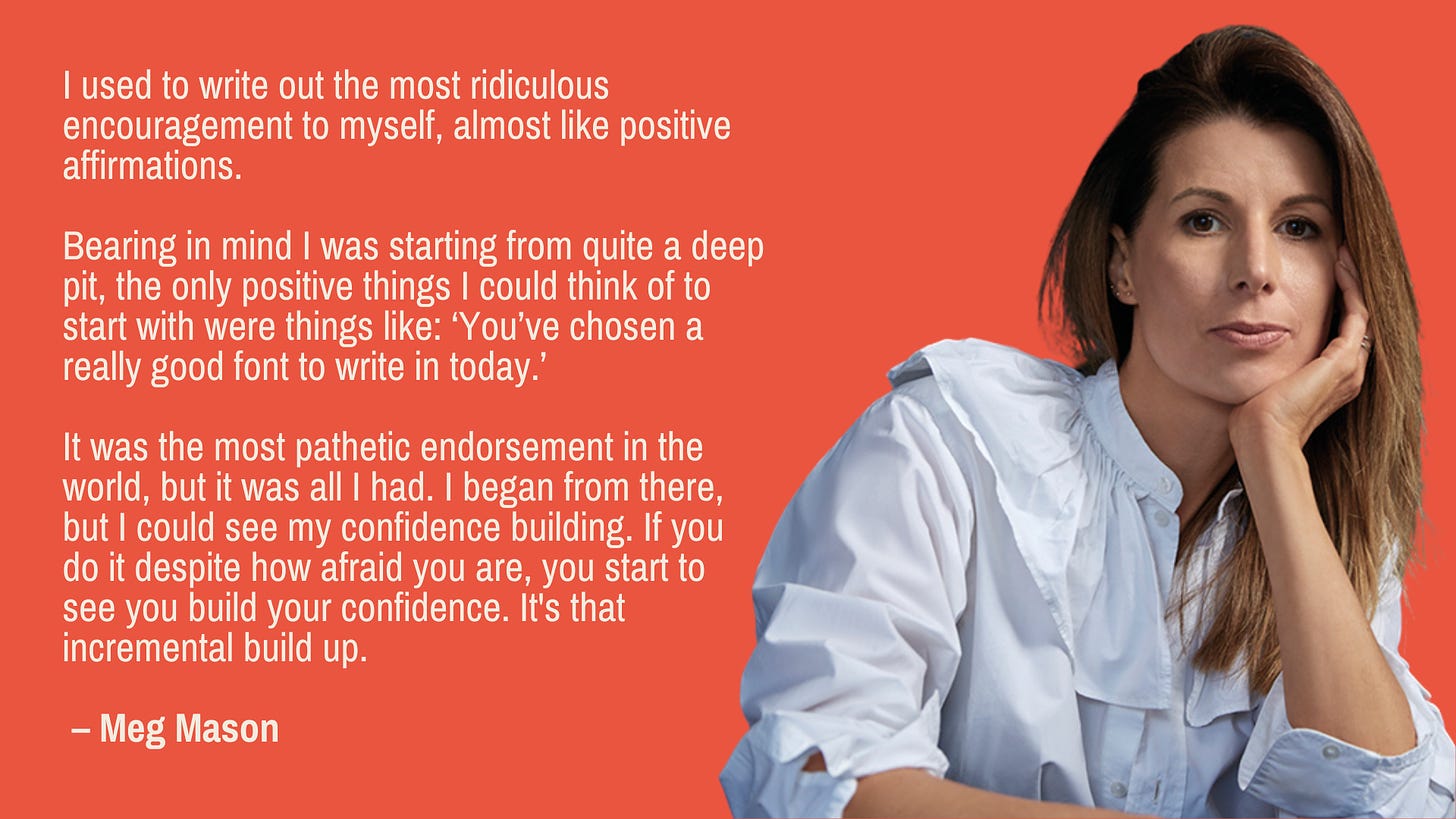The power of noticing good things
Reframe how you feel about your writing by seeking out the positive - inspiration from novelist Meg Mason's choice of font and Bec's teetering pile of notebooks.
When I left my last job, I was gifted a small notebook by a thoughtful colleague. He knew I wrote and this was the perfect present to see me on my way to a more creative future.
But what to use the little book for? Rather than add it to my already teetering pile of stationery I set about recording good things at the end of my day.
I mentioned this was part of my shut down ritual - you can read that post here and get inspired by Cal Newport’s magic phrase.
Why focus on the good?
I don’t know about you but when I get to the end of a writing session I’m usually feeling pretty tired and drained. Writing is after all a higher order cognitive function and all that creative energy takes a heavy toil on limited brain fuel.
The problem is, when I’m feeling drained I feel low, which means I am more likely to look back on the session negatively. Even if it has gone well!
There are a few reasons for this - the first is a negativity bias. This trait evolved in humans to help us survive. We need to remember bad things so we learn to avoid them in the future. Great for survival, not so good for keeping going with the writing after a disappointing session.
The peak end effect
As Nobel-prize winning professor of psychology Daniel Kahneman found, when making judgments, people consistently weight the negative aspects of an event more heavily than the positive aspects. He found this was particularly the case at the end of something.
Known as the ‘peak end effect’, we overly emphasise how things end and this colours our whole view of what came before. So if I’m knackered and feeling low, well, it feels like the whole day has gone to pot.
Finally, if we follow our brain’s natural instinct to remember the negative, then over time that’s what our memories will be made of. Consider your memory to be like a camera in that it will only capture what you focus on. The good news is that we can change that focus, it just takes a little effort.
Point your camera at the positive
Focusing on three good things, especially for my writing, worked for me in a way that previous attempts at keeping a gratitude journal failed. I kept my notebook on my desk next to my computer, which prompted me to use it.
Its small size encouraged brevity and specificity as I learned to keep the good things really tiny, from a few minutes of attention, a good idea or word, sometimes just showing up and honouring a writing session even if I deleted more than I generated.
Over the years I've sought out stories and further research to back up this practice. Novelist Meg Mason used it to dig herself out from a debilitating writing block - and thank God she did as the result was much-loved bestselling novel Sorrow and Bliss. See quote below. Author Ross Gay used a similar approach in The Book of Delights - which is an absolute joy to read.1
Positive psychologists and resilience researchers have found that as we focus on gratitude, on good things or even on things we found funny during the day, we build and strengthen neural connections that reframe our memories. That not only helps us to remember good things but makes us more resilient long term and better able to weather the storms ahead. In writing and in life.
Adding to my pile of good things
I got into a habit of noticing good things and over time, it helped me seek out, notice and appreciate positive moments as they happened.
I started that first notebook in June 2017, that’s over 2,300 days ago, which means I am close to 7,000 good things in my stack of tiny notebooks.
Each of those words is evidence that there is something good to be found in my writing life, and that gives me fuel to keep going.
See you soon, Bec x
The Marginalian’s celebration of Gay’s yearlong “experiment in learning to notice, amid a world that so readily gives us reasons to despair, the daily wellsprings of delight” is itself a delight, read: The Book of Delights: Poet and Gardener Ross Gay’s Yearlong Experiment in Willful Gladness








This is great, Bec and Chris. Having an attitude of gratitude truly helps. A thankful heart is a magnet for blessings. Seeing, feeling, and then processing the beauty in the littlest of things hones the neurons and the hypothalamus, and fuels the hand for writing. All the best!
Thankyou for this, I loved the way you phrased this piece of advice. The way you worded it makes me want to start doing this again. I had a spell of it but it faded. Now your piece has inspired me! 🥰